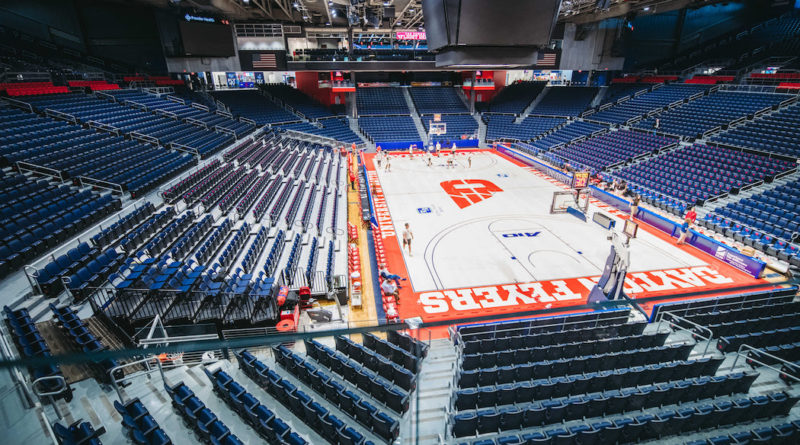Sports standstill: How the sports world has reacted to COVID-19
UD Arena is one of the many stadiums or arenas left empty when the sports world came to a crashing halt due to the COVID-19 pandemic. Photo courtesy of Shawn McLaws/Rooted Media
Luc Almeda
Assistant Sports Editor
The coronavirus brought the sports world to a standstill in March.
One league after another began to postpone their seasons and within 24 hours, almost all major American sports leagues had come to the decision to halt their season.
The first to act was the NBA, followed by the NCAA, NHL, MLB and more. Other major events like the Boston Marathon, Wimbledon, the PGA Tour and the Kentucky Derby were either postponed or cancelled. Even the Olympics, the world’s unifying sports event since 1896, was postponed for at least an entire year.
One of the country’s most profitable industries stood in vacancy with no answer. The void sports would leave not only financially but for entertainment seemed endless.
For many, the calling-off of sports was life changing. Thousands of people working at facilities, arenas and stadiums were put out of work.College athletes played their final games without even knowing it.
Although the effects would be devastating, league commissioners had no other choice than to pause their leagues, at least for the time being.
As the world progresses into finding accommodations for COVID-19, professional sports are slowly making their way back to the forefront.
One of the first leagues in the world to return was the South Korean Baseball League (KBO). They began exhibition games April 21.
Next came the German Bundesliga, one of the world’s most popular soccer leagues. Their resurrection came May 16.
The leagues that have returned are still far from their normal state.
The stadiums are vacant other than the players and coaches on the field, and even they have to follow stringent rules.
The Bundesliga coaches and substitutes are all required to wear masks, and the substitutes remain socially distanced at least six feet apart from each other on the sidelines.
Recently, Bundesliga games have had “artificial sound” filtered in to mimic a cheering or jeering crowd.
Now, the spark created by these few leagues has influenced others. Multiple associations are beginning to return to training sessions and practices.
The NCAA just announced that college football programs will be allowed to let players on campus for voluntary workouts starting in June.
After missing out on an estimated $933 million in revenue from the absence of the NCAA basketball tournament, they have the college football season in their sights.
Most recently, the NHL developed a plan to resume.
Their season was put on hold at its most pivotal time, only weeks before the start of the playoffs. After over two months, they are the first American sports league to do so.
Commissioner Gary Bettman and the NHL Players’ Association agreed on a plan that would push the season’s end all the way until the fall.
Bettman announced that 24 teams will return after each player goes through a physical, and training camps will resume after July 1.
The teams will play in a playoff tournament that takes place in just two cities.
Split up into the league’s Eastern and Western conferences, the list of potential host cities includes Chicago, Columbus, Dallas, Edmonton, Las Vegas, Los Angeles, Minneapolis, Pittsburgh, Vancouver and Toronto. It is still undecided whether fans will be able to attend the tournament.
Leagues such as the NFL, MLB, and NBA have still yet to make an official statement on their plans. Leagues outside of the U.S., such as the Premier League in England and La Liga in Spain, have resumed training.
The absence of sports is just one of the many nuisances brought on by COVID-19. Leagues know that their fans, players, and everyone involved in their organizations desperately want sports to return.
As more leagues advance towards viable solutions, sports will slowly start trickling back into the world.
For more sports news like Flyer News on Facebook and follow us on Twitter (@FlyerNews & @FlyerNewsSports) and Instagram (@flyernews)

